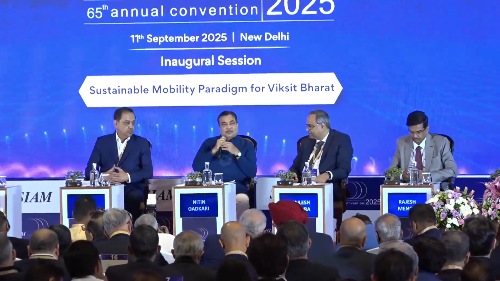Gadkari Unveils Vision for Sustainable Transport and Safer Roads at SIAM Convention
Highlighting India’s status as the world’s third-largest automobile market, Gadkari underlined the need to strengthen public transportation systems to make them more efficient, affordable, and comfortable.

- Country:
- India
At the 65th Annual Convention of the Society of Indian Automobile Manufacturers (SIAM), Shri Nitin Gadkari, Hon’ble Union Minister of Road Transport & Highways, laid out the Government’s long-term roadmap for India’s transport sector. Addressing a gathering of industry leaders, policymakers, and stakeholders, he emphasized the dual priorities of sustainability and safety in achieving the vision of Viksit Bharat by 2047.
India’s Automobile Industry and Global Standards
Highlighting India’s status as the world’s third-largest automobile market, Gadkari underlined the need to strengthen public transportation systems to make them more efficient, affordable, and comfortable. He confirmed that India will maintain alignment with global BS7 emission standards and Corporate Average Fuel Economy (CAFE) norms to curb air pollution and ensure the domestic industry remains globally competitive.
Push for Biofuels and Reduced Import Dependence
The Minister reiterated the Government’s focus on biofuels as a means to reduce India’s heavy reliance on crude oil imports. He stressed that alternative fuels not only address environmental concerns but also support rural economies by boosting farmer incomes. “Transitioning to biofuels will help India achieve energy security while giving our farmers an additional source of livelihood,” he said.
Vehicle Scrappage Policy and Industry Benefits
Gadkari informed the audience that more than 3 lakh vehicles have already been scrapped under the recently implemented vehicle scrappage policy. This, he noted, benefits multiple stakeholders: the automobile industry gains from renewed demand, the government reduces pollution and road hazards, and the environment experiences lower carbon emissions.
Logistics and Economic Competitiveness
Looking at the broader economic picture, the Minister expressed confidence that India’s logistics costs—currently among the highest globally—would come down to single-digit levels by the end of this year. Lower logistics expenses are expected to enhance India’s competitiveness in global trade and strengthen supply chain efficiency across industries.
Road Safety and Social Responsibility
Calling road safety a critical national priority, Gadkari urged greater public awareness campaigns and the involvement of NGOs to influence driver and pedestrian behaviour. He introduced new incentives for road safety heroes, stating that individuals aiding accident victims—termed ‘Rah-Veers’—will receive a cash reward of ₹25,000. In addition, accident victims themselves will be eligible for insurance coverage of up to ₹1.5 lakh.
Towards Viksit Bharat 2047
The Minister concluded by noting that sustainable mobility, reduced pollution, affordable logistics, and safer roads will together pave the way for a stronger India by 2047. The automobile sector, he emphasized, will play a pivotal role in this journey, requiring innovation, collaboration, and strict adherence to safety and environmental standards.
ALSO READ
Kerala's Road Safety Initiative Stalled Despite Rising Accidents
Paving the Way to Zero: India's Bold Road Safety Initiative
Experts Harness Technology to Reassess Thamarassery Ghat Road Safety
Over 600 Offenders Nabbed in National Road Safety Blitz Across Provinces
The Speed Dilemma: Tackling Road Safety Through Smarter Strategies










